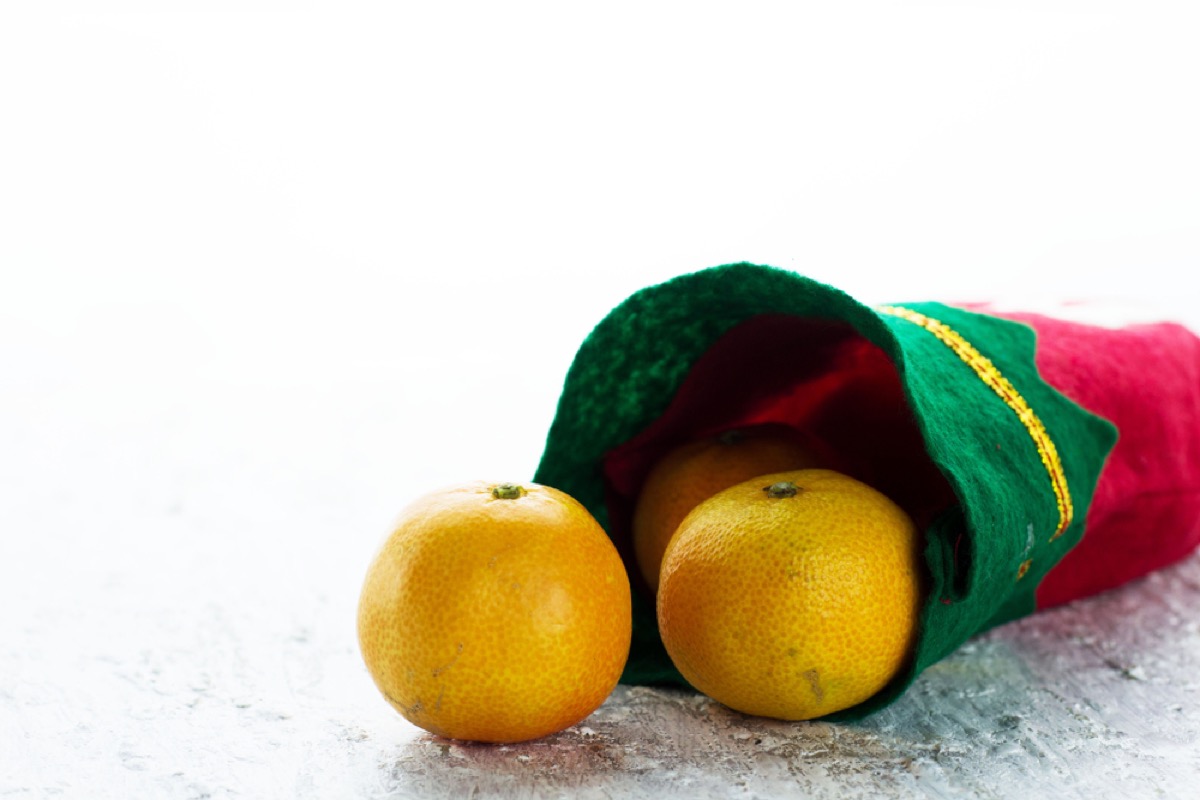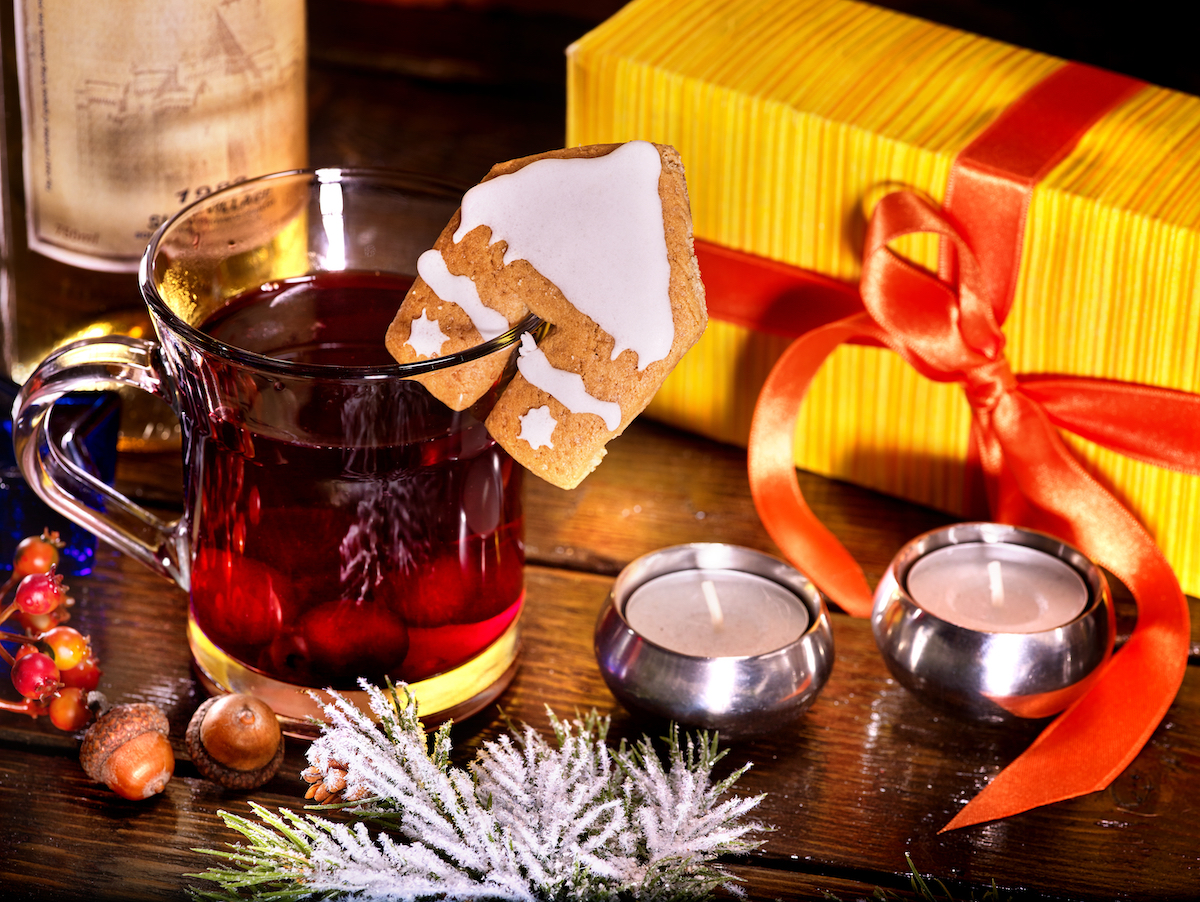Read the original article on Best Life. Turns out, there’s a reason why A Christmas Carol is packed with ghosts. Christmas wasn’t always just about cheer and feasting—spooky tales and hauntings were also once a central part of the holiday. “Telling ghost stories during winter is a hallowed tradition,” author Colin Dickey explained to Smithsonian magazine. He notes that the “custom stretches back centuries, when families would wile away the winter nights with tales of spooks and monsters.” Over time, these spirits were relegated to Halloween and their role in Christmas continued to diminish until they rarely made any appearances during the winter holiday, outside of the classic Charles Dickens tale. Instead of just roasting chestnuts on the open fire, maybe it’s time we told scary stories beside it as well. As Dickey notes, “It’s a refreshing alternative to the oft-forced yuletide joy and commercialization; resurrecting the dead tradition of ghost stories as another way to celebrate Christmas.” And for more holiday traditions that you may not know of, check out these 20 Ways Christmas Is Celebrated Differently Across the U.S. Have you ever wondered why the classic children’s nursery rhyme “Christmas Is Coming” opens with: “Christmas is coming, the geese are getting fat”? Well, that’s because a big goose used to be the main dish at Christmas, like turkey is during Thanksgiving. But times have changed, and now, families are more likely to opt for ham or turkey instead. The reason may again be due to Dickens and A Christmas Carol, according to Kelsey Mulvey of a Taste of Home. “Dickens associated goose with the struggling Cratchit family, turning it into a poor man’s supper,” she notes. “Another hunch is the rise of agricultural technology in the 20th century made it easier and more affordable to buy other meats.” So, let’s mix things up this Christmas and bring the goose back to the center of the holiday table. And even though a goose may seem too big for your gathering, that just means more leftovers for later! There is no shortage of recipes to try out—there’s even one from Gordon Ramsay. And for the one food that most people avoid this holiday, check out This Is the Most Hated Christmas Dish, Survey Says. Oranges used to be standard stocking stuffers, a tradition that is believed to date back to the legend of St. Nicholas himself, or at least to the Great Depression, when citrus was as extravagant a gift as most families could afford. While some people still practice this Christmas custom, it is less common than it once was. But it’s an easy, inexpensive, and healthy tradition worth reviving. And for more inexpensive treats to put in your loved ones’ stockings, check out these 20 Amazing Stocking Stuffers Under $20 Everyone Will Love. A big part of early Christmas celebrations was what historians call “social inversion,” in which the usual social hierarchy was flipped. The poor could demand figgy pudding from the rich and workers got to (playfully) put their bosses in their places. Part of this tradition, which was practiced in Europe, included assigning a “Lord of Misrule.” Up until the 17th century, a “lord” was put in charge of making sure that fun reigned during the Christmas season—which included planning events or even simply introducing a bit of anarchy to the proceedings. Traditions varied from one country to another, but the one consistent thing was that those who were usually in charge had to defer to an unusual master—and it typically led to some wild holiday fun. If you were to deem someone the “lord” of your 21st century Christmas gathering, you could create your own fun. For example, the “lord” could decide who gets stuck cleaning the dishes after dinner and what Christmas movie the family gets to watch later in the evening. It’s a great way to make your Christmas at home a little more exciting this year. And for some ideas of what the watch, check out The Best Christmas Movie of All Time, According to Critics. In early January, many Christians around the world celebrate Epiphany, the day when Christians believe the Three Wise Men realized that Jesus was the son of God. But Twelfth Night, held on Epiphany Eve, was a particularly English tradition—and one that isn’t practiced much anymore even in the U.K. The festivities generally include drinking a form of warm cider, singing, and feasting. It all culminates with cutting the Twelfth Night cake, a big ring-shaped fruitcake in which a bean is baked inside (considered to be good luck for whoever finds it). “These days, not many Brits know much about Twelfth Night, but in the medieval and Tudor periods, it was more important than Christmas Day,” Johanna Derry wrote for The Telegraph. “And there are plenty of Epiphany rituals—especially regarding food—which are well-worth passing onto the next generation.” Although Americans have never really had a Twelfth Night tradition, doesn’t a small celebration during the first week of January, to ring in a new and hopefully happier year, sound like a good idea? We certainly think so! Speaking of British holiday traditions we should adopt here, let’s add Smoking Bishops to that list. And no, this term isn’t a reference to a religious fellow with a pipe; it’s used to describe a particular type of mulled wine. It combines port, red wine, and a whole ton of spices to create an intoxicating brew. It also has the distinction of getting a shoutout in A Christmas Carol. For more new and old holiday traditions sent to you directly, sign up for our newsletter. You may have a whole collection of outfits that you wanted to wear this year, but never got the chance to. But now, you probably have no interest in wearing jeans until you absolutely have to. But maybe this Christmas is the perfect time to wear your best outfit when you sit down for dinner. As Grazia Daily social media editor Phoebe Parke puts in her case for dressing up on Christmas: “If we’re going to be overindulgent with our food, decorations, drinks, and gifts… why not our clothes? If the turkey (or chicken in my case) takes say two to three hours to cook, why can’t I take half that time to get ready? If you can’t dress up on Christmas Day, when can you?” Remember that outfit you were going to wear to a wedding that got canceled? The three people at your Christmas dinner table would probably love to see it. Modern technology makes it easy for anyone to create a cozy atmosphere, like the Netflix fireplace, which not only saves you the effort of getting firewood, but it also brings you choices regarding your soundtrack, type of wood, and level of crackling. Still, nothing can replace a real fire. Even if you don’t have a fireplace to build a fire in—or don’t want to deal with the hassle if you do—there is probably still some hot chocolate, thick blankets, and fuzzy socks in your house that can make it feel warm and cozy. And for some movies to watch by the fire this Christmas, check out The Single Most Popular Holiday Movie of All Time, Survey Says. If you’ve got an open fire, you might as well roast chestnuts over it. While Jiffy Pop or marshmallows might be the more likely go-to options these days, roasting chestnuts is not as complicated as you might think. (And if you don’t have a fireplace, consider roasting them in the oven instead.) You’ll practically hear Nat King Cole crooning about “Jack Frost nipping at your nose” as you roast your chestnuts. And for some Christmas trivia to share with your family throughout the day, check out these 55 Fun Christmas Facts to Get You in the Holiday Spirit. In The Morning Call, writer Daniel Patrick Sheehan remembered his early caroling days. “As a boy, I knew all the families on our block, and can name them still,” he said. They started a neighborhood tradition of caroling and Sheehan recalled that “people stood in their doorways, smiling and sometimes joining in.” Of course, going from door-to-door during these times may not be ideal for you or your neighbors, so you could always send them a virtual Christmas carol. Whether you’re singing at a table or a piano, your friends and family will be overjoyed to see the creative spin you’ve put on this old-time holiday tradition, even if it’s through a screen. And for the Christmas songs you shouldn’t sing, check out The Most Hated Christmas Songs of All Time. Take a page from the book of Clark Griswold and cut down your own Christmas tree this year—it’s not too late! Cutting down your own Christmas tree can not only be one of the most satisfying parts of your Christmas celebration, but it’s ecologically beneficial, as well.ae0fcc31ae342fd3a1346ebb1f342fcb According to Sara McCarty of Run Wild My Child, cutting down your own tree “provides more room for remaining trees to grow, which are less stressed and better situated to cope with disease and insects. Reducing competition allows for easier access to water, nutrients, and sunlight, and reduces wildfire risk by providing less potential fuel for a fire.” The key is to measure the space where the tree will be placed and to take all other necessary precautions, from bringing a tape measure to wearing boots and gloves. If done right, you and your family will have a holiday experience to talk about for years to come! In the early days of Christmas trees, people used nuts, berries, and fruits as edible ornaments. However, these DIY decorations lost favor when plastic and glass baubles took over in the late 1800s. But it might be time to bring back these decorative and delicious options that can be treats for our eyes and mouth, like a star-shaped nut ornaments or strings of popcorn. Actually, many early Christmas decorations came from nature, like wreaths from evergreen trimmings or using sprigs of holly to add festive color to a room. While store-bought decorations are more common these days, it’s easy enough to ask your Christmas tree seller for some spare cuttings so you can turn them into something reminiscent of holidays past. It wasn’t until later in the 1800s that retail and mass production led to more store-bought presents for Christmas. Prior to that, gifts were homemade. As The Week points out: “When Christmas celebrations became legal in the 1680s, gift-giving boomed. Rural Americans carved wooden toys and made pieces of needlework in the agricultural offseason to give to family members and neighbors.” But in the Industrial Revolution, “those handmade items were replaced with mass-manufactured trinkets and toys.” And with the convenience of these store-bought products in the century that followed, we’ve lost some of that homespun charm. There’s nothing more heartfelt than a personalized present that took time and thought to craft, so why not give it a go this holiday season?

